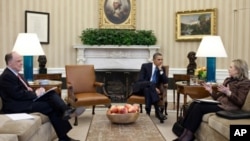White House officials denied Thursday that they are responding too slowly to Libyan leader Moammar Gadhafi’s crackdown on rebels in his country. Obama administration officials say they are moving quickly to address a fluid and dynamic situation.
President Barack Obama’s National Security Adviser, Tom Donilon, told reporters that the United States and its allies are steadily increasing pressure on Mr. Gadhafi through military and non-military means.
“We have isolated Gadhafi, denied him resources, ensuring accountability, building and maintaining international support, building capabilities to assist the Libyan people," said Donilon. "It is a fluid situation, and it is not going to be resolved overnight.”
Donilon announced that the United States will send disaster relief teams to eastern Libya through non-governmental organizations. He said the aid “can in no way, shape or form be seen as military intervention.”
The national security adviser said the United States is considering numerous military options, including imposing a no-fly zone on the Libyan military.
He said the North Atlantic Treaty Organization has agreed to send more ships to the Mediterranean Sea near Libya, and that it is considering further action.
Secretary of State Hillary Clinton said Thursday that she would meet with Libyan opposition representatives next week on her trip to the Middle East.
U.S. officials have suspended Libya’s embassy in Washington, no longer recognizing representatives of the Gadhafi government.
National Security Adviser Donilon said the pressure applied during the past three weeks has isolated Mr. Gadhafi, and has emboldened people throughout the Middle East who are pushing for democracy.
“People, especially young people, and it varies from country to country, have confronted regimes that are not performing for them or that have been repressing them, and the fear dynamic has been lost," he said.
Director of National Intelligence James Clapper told lawmakers Thursday that he believes the Libyan government will prevail over time. The chief of the U.S. intelligence community told the Senate Armed Services Committee that Mr. Gadhafi’s forces have superior weapons and logistical capabilities.
Clapper’s comments led Republican Senator Lindsey Graham to twice call for his resignation.
National Security Adviser Donilon said Clapper’s comments were based strictly on Mr. Gadhafi’s resources, and that they did not take into consideration the increasing pressure on the Libyan government.
“The loss of legitimacy matters," said Donilon. "The isolation of the regime matters. Denying the regime resources matters, and this can affect the sustainability of their efforts over time. Motivation matters and incentive matters. The people of Libya are determined to affect their future.”
White House Press Secretary Jay Carney rejected the calls for Clapper’s resignation, saying the Obama administration retains full faith and confidence in its intelligence director.
White House Defends Libya Response
- By Kent Klein














